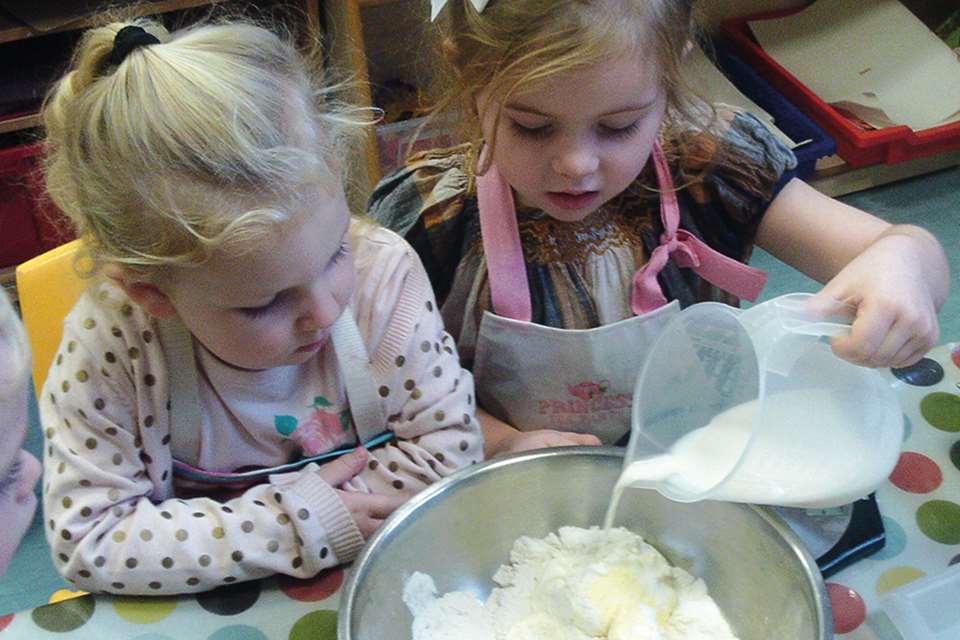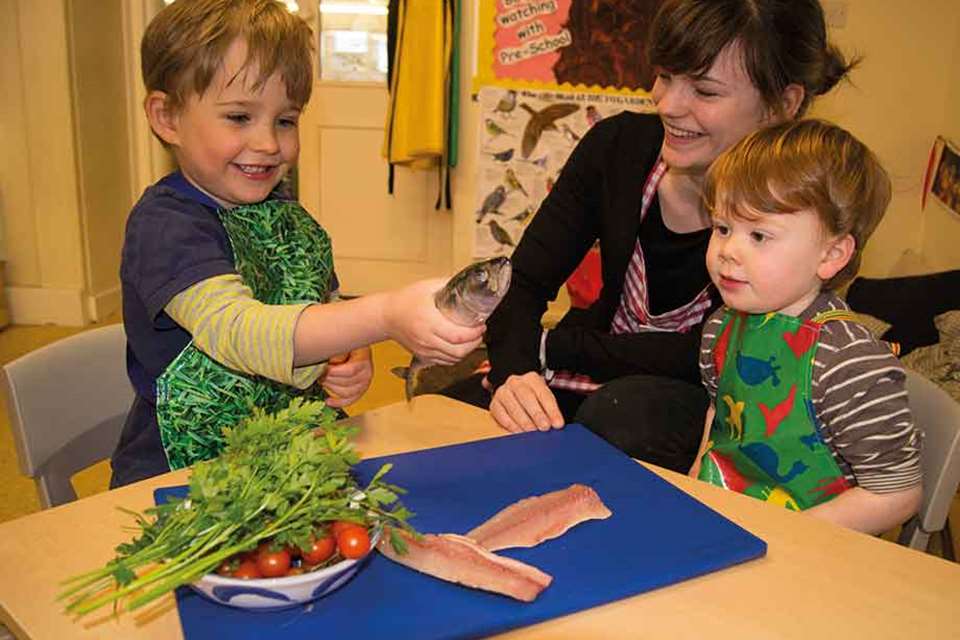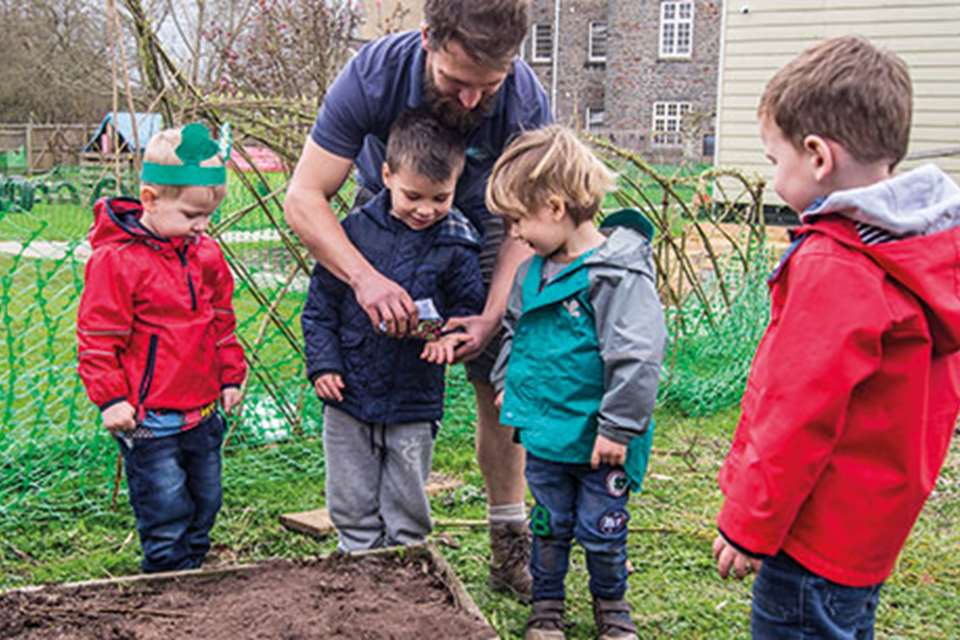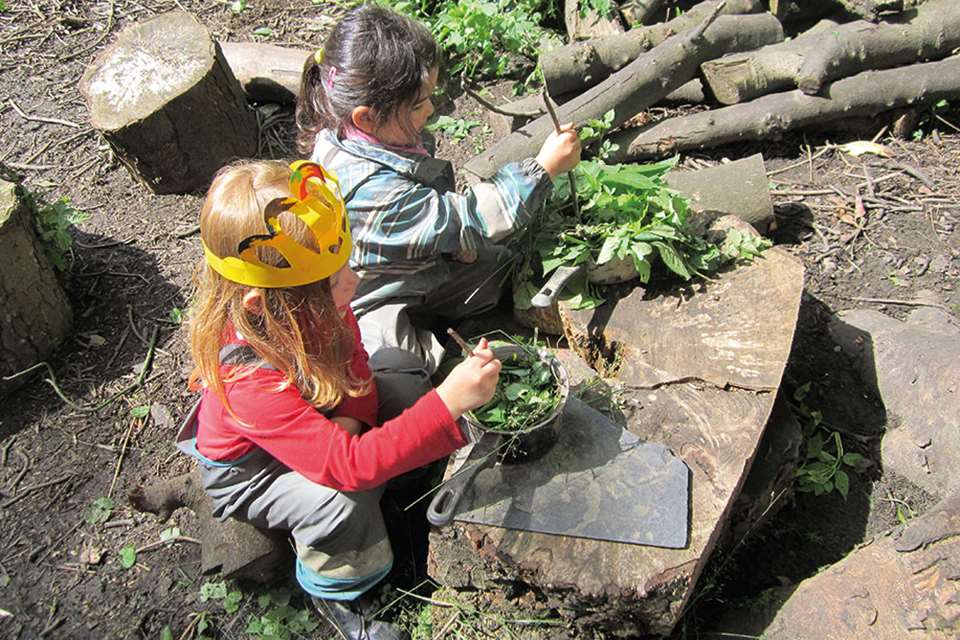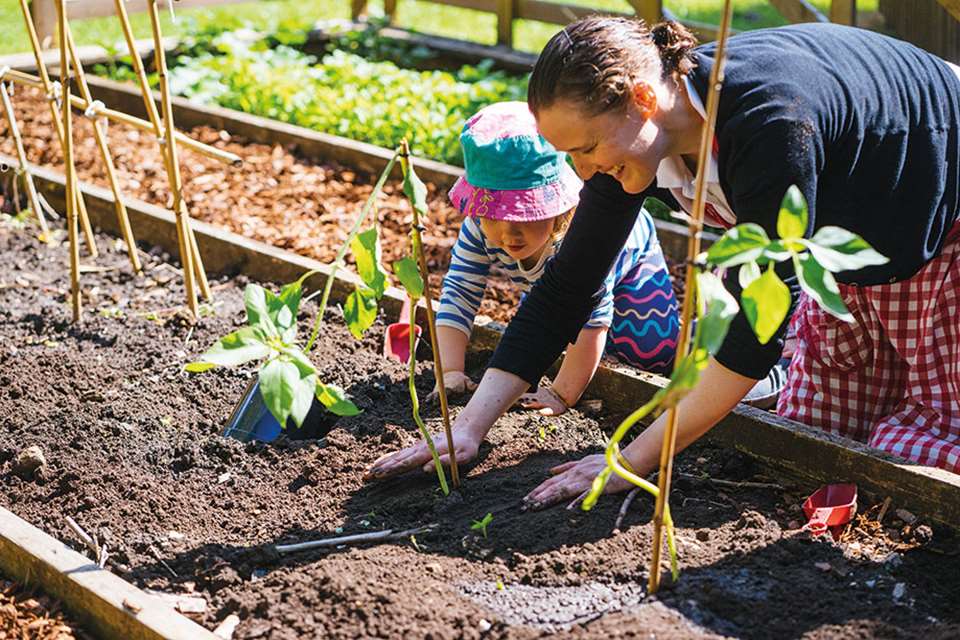Enabling Environments: Healthy Living - The bee’s knees
Annette Rawstrone
Monday, September 4, 2017
How one primary school in London has created a garden to get children interested in healthy eating. By Annette Rawstrone

Walk beside Charlton Manor Primary School’s dining hall, through the large ornate iron gates, and you’ll discover the heart of this south-east London school – its Secret Garden.
Bees and chickens, cared for by the children, live in the garden surrounded by raised beds, fruit, herb and vegetable areas, a heated greenhouse and composting facilities. There are teaching and seating areas, a wildlife pond and even a bird hide with cameras. Head teacher Tim Baker is rightfully proud of the garden that was developed from a neglected area overgrown with brambles and nettles and occupied by disused cabins.
He was inspired to transform the grounds after becoming head 13 years ago and increasingly hearing about children eating unhealthily and not knowing where their food comes from. Many of the children attending Charlton Manor – half of whom are eligible for free school meals and 80 per cent living in low socio-economic postcodes – have limited opportunities to grow things and interact with nature at home. However, now all the school’s children, from nursery upwards, help to maintain the Secret Garden alongside the school gardener.
‘The nursery children join in at least every week. There’s always lots to do from digging and weeding to watering and planting,’ says Mr Baker. ‘Many pupils do not have access to a garden at home, so this provides them with that outdoor opportunity and for everyone to get their hands dirty, to grow their own and understand where food comes from. It fulfils a multitude of roles: providing an outdoor learning resource, a place for quiet contemplation, a play area, an area to produce food, a haven for wildlife and a focus for pride at what has been achieved over the years.’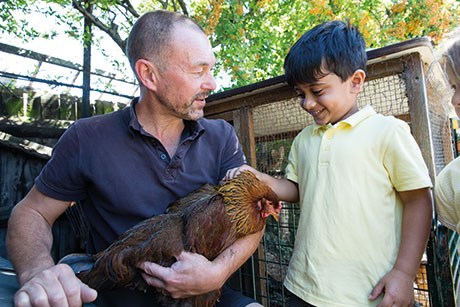
BEES AND CHICKENS
It is often presumed that Mr Baker was inspired by a personal interest in gardening and cooking, but the focus has simply grown out of his commitment to children developing healthy eating habits from an early age.
Many of the initiatives have developed organically, such as the observation bee hive, which was introduced in 2009.
‘We had a swarm of bees at the school,’ says Mr Baker. ‘The staff panicked and were afraid that we’d have to close the school, but the children were interested in them. I was amazed by how calm and fascinated they were.’
A bee catcher was called in to collect the swarm, but the experience caused the staff to give more thought to caring for their own bees. ‘Bees are so good for the environment that we decided to get some, and they give the children a real insight into the vital role that bees have to play in pollination,’ he adds.
Many of the children from Year 3 upwards, and staff, including Mr Baker, are now trained in beekeeping. Nursery children are intrigued to watch the bees in the hive through the glass sides. ‘They love the bees and don’t have the fear of them that adults do. They’ll even pick them up with their hands,’ he says. The tasty Charlton Manor honey that they produce is a bonus.
The school also has a coop and has kept chickens for six years. It started by hatching eggs, and then staff and children decided to keep the chicks and watch them grow. ‘At first the children would chase the chickens, but now they are used to them, care for them, collect the eggs and get to eat them fresh,’ says Mr Baker.
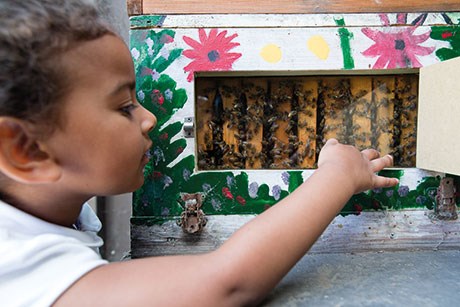
BOW TIES AND APRONS
By 2004, the school’s garden was in place, there was a focus on growing and eating healthy food and Charlton Manor had gained Healthy Schools status, but Mr Baker realised that the quality of the school’s actual food offer was slipping.
‘We had gone from the Turkey Twizzlers that Jamie Oliver campaigned against to food made from scratch, but it was always a cook following a recipe and not adding different flavours and spices. We’d have chicken pie, but the cook would never taste it to put in more thyme,’ he recalls. ‘The food offer was not tasty but we pushed hard and worked with the provider, and we now have a chef who is out of this world and has done fantastic things to change the whole school food offer.’
He prepares hot food daily, including scrambled eggs from the school’s chicken’s eggs for the free breakfast club (see box), as well as home-made soup served at dinner time which is made from vegetables harvested from the Secret Garden.
The dining hall has recently been refurbished and renamed Charlton Manor Restaurant. ‘We wanted to create an environment that everyone is happy to eat in,’ Mr Baker explains. The school has an ethos of everyone eating together, with teachers sharing meal times with the children. Even elderly people from the local community are invited to join them. ‘The children are encouraged to sit where they want in mixed age groups. They’ll sit with different friends and teachers, talk to each other and create a community – there is no worry or fear that they don’t know the teacher in the next year, and trust is built,’ he says. ‘There is an ethos to be able to open up and speak about worries from home or school.’ Mr Baker notes that the children’s behaviour is ‘incredible’ and they demonstrate empathy towards each other.
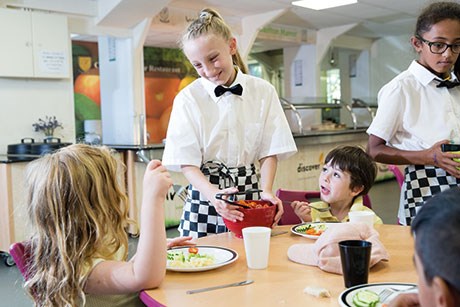
A dedicated team of student waiters from Years 4 to 6 – decked out in bow ties and aprons – help to clean and set tables, provide water and serve salad or fruit at dinner time. ‘It’s a sought-after position and they are good role models to the younger children. They help to promote healthy eating and encourage trying new foods,’ Mr Baker explains. The children’s rich food experiences are also helped by the school’s diversity – with 47 home languages spoken.
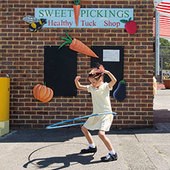 The school has now signed up with the Woodlands Farm Trust and has an allotment as well as the Secret Garden. The chef plans menus around the produce that is ready to be harvested, including the honey and eggs. This has resulted in seasonality coming back to the children’s food. Last year they harvested an impressive £1,400 worth of food. Any excess produce is sold in Sweet Pickings, the school’s shop open three days a week after school.
The school has now signed up with the Woodlands Farm Trust and has an allotment as well as the Secret Garden. The chef plans menus around the produce that is ready to be harvested, including the honey and eggs. This has resulted in seasonality coming back to the children’s food. Last year they harvested an impressive £1,400 worth of food. Any excess produce is sold in Sweet Pickings, the school’s shop open three days a week after school.
HOBS AND WORK TOPS
Cooking, healthy eating and making healthy choices were all strong parts of the school’s curriculum, but the children were limited by a lone cooker in the staff room. Their enthusiasm for growing produce led to them wanting better facilities to learn how to prepare food.
In 2013, TV chef Raymond Blanc opened their new teaching kitchen with five stoves and hobs and lots of work tops. And he is not the only celebrity chef to have been to the school – Jamie Oliver visited and said he was amazed that children in a Year 1 class were using a bridge hold to cut grapes.
‘We believe that children need to be shown how to risk-assess from an early age. The only danger is if it’s not explained to them how to properly use knives and behave around hot pans,’ explains Mr Baker. ‘We don’t say not to cross the road, but we reinforce the dangers, hold their hands and point the dangers out. We tell our staff and parents that the children are safer because they know what to do.’
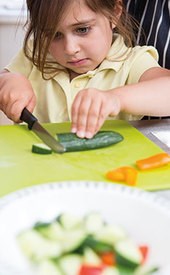 Mr Baker is a firm believer in active learning and that children learn through doing – timing cooking, weighing, measuring and making comparisons. When first starting the garden project, he found it a challenge to get some staff and governors on board, but overcame this by demonstrating how all the curriculum could be covered through the garden with hands-on, practical learning. The nursery children even learn concepts of repeating patterns in the teaching kitchen while putting pieces of fruit on skewers to make kebabs.
Mr Baker is a firm believer in active learning and that children learn through doing – timing cooking, weighing, measuring and making comparisons. When first starting the garden project, he found it a challenge to get some staff and governors on board, but overcame this by demonstrating how all the curriculum could be covered through the garden with hands-on, practical learning. The nursery children even learn concepts of repeating patterns in the teaching kitchen while putting pieces of fruit on skewers to make kebabs.
COMMUNITY CAFE
Now, not only is the children’s diet healthier, but Mr Baker believes their whole way of thinking is. Teachers were ‘pleasantly surprised’ when many Year 4 children while on a trip to France ate the fruit in their packed lunches and left the chocolate.
‘Parents will write in to school saying that their children make them buy healthy stuff and ask for recipes because the children love the food served at school,’ Mr Baker adds. The healthy ethos is spreading with the school opening a community café from 10am-2pm on weekends. The café has the added benefits of introducing local people to the school and building a sense of community.
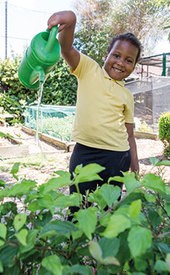 The school’s work has led to it receiving accolades from many places, including being an RHS Five Star Gardening School and Healthy Schools London gold award holder. Meanwhile, children’s confidence has also grown as they have participated in events such as the RHS Chelsea Flower Show.
The school’s work has led to it receiving accolades from many places, including being an RHS Five Star Gardening School and Healthy Schools London gold award holder. Meanwhile, children’s confidence has also grown as they have participated in events such as the RHS Chelsea Flower Show.
Building the outdoor classroom and getting children passionate about gardening and cooking has taken a lot of time and hard work, but Mr Baker urges other practitioners not to be daunted. ‘I’d advise schools or nurseries to start with just one project, such as building raised beds to grow vegetables and then use them to cook a meal. Food growing naturally leads on to cooking. Once you’ve started, you’ll think what else would be good and start more linked projects,’ advises Mr Baker. ‘For us, at first it was just the garden – 13 years ago we never envisaged all that we’d do.’
FUNDING
Charlton Manor’s gardening and cooking initiatives have been supported by funding from a wide range of places – from the Big Lottery to Charlton Community Fund and Co-op Community Fund. It is one of ten schools that receives funding to provide a free breakfast club in partnership with Greggs Foundation and the Mayor’s Fund for London. Children, including pupils from other schools, are provided with a nutritional breakfast and supervised from 7.30am from Monday to Friday.
Head teacher Tim Baker received assistance for many of the applications from a former teaching assistant, who was a fundraiser.
‘I used to fill in the funding applications the day before the deadline, but she taught me to not leave it to the last minute so that, if needed, they can ask for more detail or certain figures,’ he says.
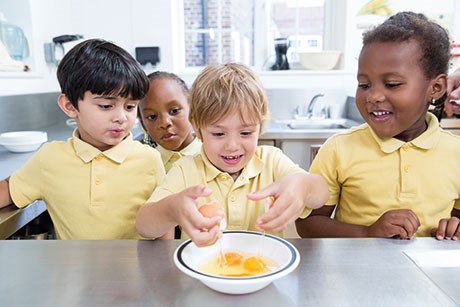
He believes there are a lot of funds available for nurseries and schools. Applying for a fund can then lead to being signposted to others.
MORE INFORMATION
www.charltonmanorprimary.co.uk
RHS Campaign for School Gardening, https://schoolgardening.rhs.org.uk/home
Charlton Manor has produced a book, Now We’re Cooking, to help schools deliver the National Curriculum through food (£20 plus £2 p&p). Order by emailing: acoulstock@charltonmanor.greenwich.sch.uk
Charlton Manor is working on a recipe book for parents, due out this month, and has a YouTube channel demonstrating how children can cook at home: www.youtube.com/user/CharltonManor
Mr Baker and two colleagues are also establishing a charity, Roots4Life, for engaging schools and the local community in food-focused education


